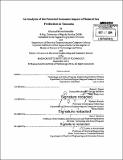| dc.contributor.advisor | Robert J. Stoner. | en_US |
| dc.contributor.author | Umeike, Ekenedilinna (Ekenedilinna Onyedikachi) | en_US |
| dc.contributor.other | Massachusetts Institute of Technology. Department of Electrical Engineering and Computer Science. | en_US |
| dc.coverage.spatial | f-tz--- | en_US |
| dc.date.accessioned | 2015-02-25T17:11:58Z | |
| dc.date.available | 2015-02-25T17:11:58Z | |
| dc.date.copyright | 2014 | en_US |
| dc.date.issued | 2014 | en_US |
| dc.identifier.uri | http://hdl.handle.net/1721.1/95586 | |
| dc.description | Thesis: S.M. in Technology and Policy, Massachusetts Institute of Technology, Engineering Systems Division, 2014. | en_US |
| dc.description | Thesis: S.M., Massachusetts Institute of Technology, Department of Electrical Engineering and Computer Science, 2014. | en_US |
| dc.description | Cataloged from PDF version of thesis. | en_US |
| dc.description | Includes bibliographical references (pages 61-68). | en_US |
| dc.description.abstract | Following substantial discoveries of natural gas in recent years, Tanzania has new options for economic development. The country's policy makers are faced with having to make decisions about how best to utilize the gas in order to drive economic development The options before the government are whether to export the gas or to use it domestically. Exporting natural gas can be a very lucrative source of government revenues which can in turn be invested in improving education, access to healthcare or other areas to improve the general and economic well-being of the populace. Encouraging domestic use on the other hand may not be as lucrative in terms of government revenues, but is necessary for increasing participation along the gas value chain in particular and stimulating in other sectors of the economy that benefit from easy access to gas or its downstream products. In this study, I considered the options of using the gas in the production of liquefied natural gas (LNG) intended for export, as well the domestic manufacture of urea and electricity. I used a scenario analysis model to investigate and assess these options according to their direct economic value as well as their revenue generating potential. These two parameters were chosen as proxies for and economic growth and government ability to invest in public goods respectively. As part of the assessments carried out, special attention was paid to the different scenarios associated with meeting the government's national electrification plans as determined by their electricity demand forecasts. The results show that among the options considered, domestic utilization of the gas for power production will have greatest economic value while LNG exports hold the highest revenue potential. Furthermore, they demonstrate that even though using the natural gas for electricity production would be the most valuable option for the Tanzanian economy per unit of gas, allowing new generating capacity to be dominated by gas plants as has been done in some other gas rich countries would not be economically prudent. Instead a mix of technologies will provide the best balance between stimulating domestic gas consumption and providing cost effective electricity to consumers. Importantly, I find that future policy must ensure that domestic utilization of gas is not sacrificed in favor of exports even if it means reduced government revenues. | en_US |
| dc.description.statementofresponsibility | by Ekenedilinna Umeike. | en_US |
| dc.format.extent | 68 pages | en_US |
| dc.language.iso | eng | en_US |
| dc.publisher | Massachusetts Institute of Technology | en_US |
| dc.rights | M.I.T. theses are protected by copyright. They may be viewed from this source for any purpose, but reproduction or distribution in any format is prohibited without written permission. See provided URL for inquiries about permission. | en_US |
| dc.rights.uri | http://dspace.mit.edu/handle/1721.1/7582 | en_US |
| dc.subject | Engineering Systems Division. | en_US |
| dc.subject | Technology and Policy Program. | en_US |
| dc.subject | Electrical Engineering and Computer Science. | en_US |
| dc.title | An analysis of the potential economic impact of natural gas production in Tanzania | en_US |
| dc.type | Thesis | en_US |
| dc.description.degree | S.M. in Technology and Policy | en_US |
| dc.description.degree | S.M. | en_US |
| dc.contributor.department | Massachusetts Institute of Technology. Department of Electrical Engineering and Computer Science | |
| dc.contributor.department | Massachusetts Institute of Technology. Engineering Systems Division | |
| dc.identifier.oclc | 903650887 | en_US |
